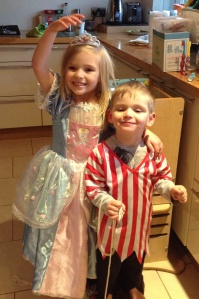
My Reason For Change
As a writer I know the power of words. Words can move, heal, hurt, destroy. Change the world. Think about Martin Luther King Jr’s speech “I have been to the mountain top”. Or the words in the bible. As a writer I should know to mind my words but, like any person of a certain profession, I don’t always follow my own beliefs.
A while ago I read a poem called powerful words on Chris McMullen’s blog and I said something in the comments about the words I use to my children being the wrong ones and how damaging that was and how I can’t take them back.
It’s something I’ve been worrying about more and more lately. Then, today, I read this article on Facebook called Ten Ways to Guide Children Without Punishment and I felt like I’d been whipped. It starts with these words,
“The reason a child will act unkindly or cause damage is always innocent. Sometimes she is playful and free spirited, and other times, when aggressive or angry she is unhappy or confused. The more disturbing the behaviour, the more the child is in pain and in need of your love and understanding”
Oh my it’s so true. I get most angry with my son when he’s at his happiest because that’s when he’s at his most destructive/deaf/irritating. Lately I’ve started hearing some of the terrible things I say to my children when I’m in a rage: things that were probably said to me, that I believe about myself deep down, that I’m teaching them to believe, and so the cycle continues.
“You’re lazy,” “You’re mean”, “You’re being selfish”, “You’re unkind”, “You’re trying to hurt me”.
These things are not true of children, certainly not two wonderful children under five. I excuse myself (or else I couldn’t live with myself a moment longer) by saying I’m exhausted, they don’t remember it, that I’m teaching them not to be bullies, and a load of other rubbish that just isn’t true.

My amazing kids!
To complete the trio of articles that have a) made me feel like ending my own life I hate myself so much and b) have forced me to see the need for change, is this one I found on Twitter called Why We Told Our Kids to Stop Saying “Sorry”. It discuss why the author has stopped her children apologising. She said to her child, after his umpteenth sorry, that, “Your sorries don’t mean anything when your behavior shows me that you aren’t sorry at all.”
I say sorry. All The Time. I’m sorry for living, I’m sorry for being a monster, I’m sorry it’s raining. Either it’s something I can’t control or it’s something I could change if I tried hard enough. Sorry doesn’t cut it. There’s a meme on Facebook about comparing a crumpled piece of paper to a bullied child: you can smooth the paper but the creases never go. You can say sorry but you can’t unsay the hurtful words.
As I write this I feel sick to my stomach. I feel like I have hurt my children beyond repair, beyond redemption. But the more I beat myself up about being a monster, saying the hurtful things I heard in my childhood, the more I give myself permission to continue because, hey, I’m a monster already.
I am not a monster. And, no matter how exhausted, overwhelmed, unhappy I am with being a parent, it is not my children’s fault. So, today, I have to make a commitment to stop. In my post yesterday I mentioned the book Happiness as a Second Language. The author, Valerie Alexander, stopped by to encourage me to read the book some more. So last night I did. I read all the way to Chapter Nine, although I need to read it again to take it in properly. The two chapters that really resonated were Chapter Eight – Adjectives and Chapter Nine – The Negative Form. Because these are the two I know I need to learn. Adjectives: the describing words I use on myself and my children, and learning not to be a negative person.
Because another thing I’ve learned from childhood is that sympathy = attention, that being broken means people try to fix you, help you, love you. That being happy means people resent you, ignore you, take you for granted. So I’ve learned to be miserable, so people ask “what’s wrong?” Except of course they stop asking after a while, or get bored of hearing the same ol same ol. So you up the ante. You think of taking your own life because then “That will show them I’m really miserable.” No, that just shows that you were too pathetic to help yourself.
Chatting to my sports massage friend yesterday she says it frustrates her when people refuse to help themselves get better. That’s me. I’ve had an injured knee for eighteen months but will I do the exercises to get better? No. I make excuses that they hurt, or I’m tired, or I don’t believe they’re working. Instead of growing up and just getting on with it. The only person that suffers from that is me (and my dog and my family.)

I want to learn how to be happy
So I don’t want to be a negative person anymore. I don’t want to steal other people’s happiness to make myself feel better. An “Indirect Negator” in Valerie’s words, someone “whose own unhappiness is so palpable that it risks becoming contagious.” Equally I don’t want to be around people like that (and I know a few).
The next thing I am going to do is choose five adjectives I want to describe me: five things I want people to think when they think about me, and live those values. This is an exercise I think I can do because I obsess about what people think about me all the time. That probably needs fixing too, but at least I can use it to my advantage.
Being a wordy sort of person I came up with alliterative adjectives so they’re easier to remember. There are many traits I’d like to be: successful, funny, strong, gracious, social, but I have to be realistic about what is in my control and what fits with my personality. So the five I have chosen are:
- Calm
- Confident
- Caring
- Compassionate
- Clever
Calm: Since becoming a parent I am never calm. I rush around saying “we’re late” or I’m yelling or sniping at the kids, or I’m trying to do one hundred things at once. Yet, way back when, I used to work for a man who said “You’re always calm.” I said, “I’m a swan, I’m paddling furiously underneath.” But what mattered was that, on the exterior, I was calm. As a parent that’s the important bit. Honesty is great, but I am too honest about my feelings with the kids. They will feel calmer and happier if Mummy is calm. So, back to being a swan. This great article on Aha! Parenting will help.
Confident: My lack of self-confidence is something I wear like a badge. I second and third guess myself on everything. I dither, I ask for opinions. I change my mind, or let my mind be changed. I cry. I negotiate with the kids. I let other people’s parenting affect how I feel about mine. And yet the one thing I want for my children is self-confidence. To the point where I want to put them in a private school to learn it, because I know they can’t learn it from me. And yet the private school I visited was not right for my children.
I did use to have the courage of my convictions, when I worked for a living. I knew my stuff and I would argue my case (not always calmly!) and stand my ground. Against clients, against directors. No wonder I never got promoted. Now, though, as a writer and a parent, all I read are articles telling me how I’m doing it wrong, how I should do it better, and I believe every contradictory word. (Read this post by Ava Neyer for an hilarious summary of how contradictory parenting advice can be). So, I’ll start with the mask and hopefully confidence will come.

Learning Kindness from my Kids
Caring: This would have been a given, once. I considered myself an empathetic person, someone who cared about others. I seem to have lost that at the vital moment. Now I’ve become a monster. I say to the kids all the time “I don’t care” when they’re whinging about something. Arrgghh. Enough said. I will care. I will listen. I will kiss the grazed knees and listen to the fights and try not to get involved but still be present and caring.
Compassionate: Similar to above, but more about seeing other people’s points of view. I can be very judgemental and it has only got worse since becoming a parent. Part of my defence mechanism against feeling like a terrible parent is seeking out instances of other people’s terrible parenting to make myself feel better. I have probably made other people feel bad in the process. I want to learn to be more compassionate to other people (especially my family).
Clever: This used to be the one thing I knew I was, back when it was easy, when it was about exams and studying and stuff. The longer I’ve lived the more I’ve realised I know nothing. But the brain is still in there, beneath the lack of sleep and the low self-esteem and the self-doubt. I know stuff about writing, but through modesty, humility or fear, I can’t present myself as an authority here on the blog or to others. Yet I probably know more than I realise. Ditto for marketing, history, literature and some other stuff. I don’t want to bore the pants off people but remembering I have a brain and using it sometimes might help the other stuff.
Anyway, sorry for the long, self-indulgent post. When I finished writing it at 6am this morning I nearly hit delete. But then, for me, much of the beauty of the blogsphere is learning from others, seeing others experiencing pain and surviving it. Regular followers know my demons. By declaring to you all that I’m going to do this, I have made it a real thing. I will try and some days I will fail. But by trying to live the values of Calmness, Confidence, Caring, Compassion and being Clever, I hope to make a difference before it’s too late.





